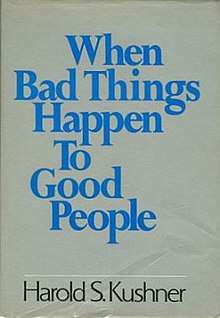When Bad Things Happen to Good People
When Bad Things Happen to Good People (ISBN 1-4000-3472-8) is a 1981 book by Harold Kushner, a Conservative rabbi. Kushner addresses in the book one of the principal problems of theodicy, the conundrum of why, if the universe was created and is governed by a God who is of a good and loving nature, there is nonetheless so much suffering and pain in it - essentially, the evidential problem of evil. The book argues for theistic finitism.[1] Kushner proposes a finite God solution to the problem of evil. God is benevolent but not all-powerful to prevent evil.[1]
 First edition | |
| Author | Harold Kushner |
|---|---|
| Country | United States |
| Language | English |
| Subject | Theism God Religion |
| Genre | Non-fiction |
| Publisher | Schocken Books |
Publication date | 1981 |
| Pages | 176 pp |
| ISBN | 1-4000-3472-8 |
| OCLC | 56349149 |
| Followed by | To Life: A Celebration of Jewish Being and Thinking |
The book is dedicated to the memory of Kushner's young son, Aaron, who died at the age of 14 in 1977 of the incurable genetic disease progeria.[2] Rabbi Kushner's book was a New York Times bestseller for many months in the non-fiction category.
Thesis
Kushner seeks to offer comfort to grieving people. His answer to the philosophical problem is that God does his best and is with people in their suffering, but is not fully able to prevent it.[3]
Kushner's beliefs, which seem to question God's omnipotence, have been criticized by some conservative scholars associated with Orthodox Judaism[4] as well as evangelical Christianity.[3]
Atheist philosopher Michael Martin has disputed Kushner's finite God theodicy.[1]
Recognition
- New York Times bestseller, "nonfiction"
References
- Michael, Martin. (1990). The Finite God Theodicy. In Atheism: A Philosophical Justification. Temple University Press. pp. 436-438. ISBN 0-87722-642-3
- John Frame (1994). Apologetics to the Glory of God. p. 157. ISBN 0-87552-243-2.
- Rabbi Y. Kirzner, Making Sense of Suffering ISBN 1-57819-757-0.
External links
- "When bad things happen to good people" - 2001 edition with a new preface
- “Rabbi Kushner: An 'Accommodation' With God” interview with Rabbi Kuschner on NPR from 2010 at the 30th anniversary of the publication of the book.